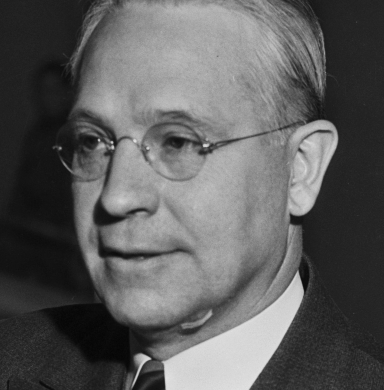Laying a Foundation for the Future: Looking back at the legacy of Dr. Ben Cherrington
On March 28th of this past year, Dean Mayer spoke at the grand opening of the new Cherrington Commons while attendees enjoyed an array of mid-day empanadas. As the Dean stood in front of everyone, a slideshow of photo contest submissions scrolled through on the large screen behind him while he spoke about the common space's namesake— Dr. Ben Cherrington. It was particularly fitting that the commons area, a space dedicated to bringing students together, was named in his honor. For those familiar with Dr. Cherrington, or aware of his contributions, this connection may be evident. He was a person driven to offer individuals from diverse disciplines and backgrounds a place to learn and study the politics of the world—a vision that the Korbel School continues to uphold.
So, who exactly was Dr. Cherrington, and what did he do to deserve having an entire common space named after him? As it turns out, every student at Korbel has a closer connection to this figure than they might realize. Whenever someone attends a class in a room on the older side of the building, they are actually sitting in the old Cherrington Hall. Prior to the 2014 construction of the Anna & John J. Sie International Relations Complex, Cherrington Hall, now housing the Cherrington Commons, stood alone. Dr. Cherrington's legacy is deeply ingrained in both the physical and academic structures of Korbel—from the building itself to the school's emphasis on "people-to-people" diplomacy. He directed the Social Science Foundation at the University of Denver, invited Josef Korbel to join the institution, and is widely credited with bringing the field of international relations to one of the United States' most landlocked major cities.
Dr. Cherrington was born in 1885 in Nebraska, the only child of Canadian and English immigrants. He pursued his bachelor's degree at the University of Nebraska, majoring in sociology and economics. He later moved to the University of California, Berkeley, where he earned his master's degree. It was during his time in Berkeley that he became interested in international education after witnessing the university's lack of concern for the specific needs of international students. He played a crucial role in establishing Berkeley's International House while working as the secretary of the YMCA in Berkeley. This eventually led to his promotion as the secretary of the Student YMCA, headquartered in Denver and encompassing all colleges in the Rocky Mountain area.
In Denver, he crossed paths with philanthropist James H. Causey, described by the Rocky Mountain News as a man with "liberal convictions." Causey intended to provide a grant to the University of Denver to further the study of social friction, and after consulting with Dr. Cherrington, the Social Science Foundation (SSF) was established at DU. Causey entrusted Dr. Cherrington with leading the institution, which served as the platform for promoting his philosophy on conducting international relations.
At the core of Dr. Cherrington's philosophy was a simple belief: "The human race ought to get along." This conviction drove him to have a profound impact on international politics, an impact that cannot be understated. In 1945, he acted as a consultant to the US delegation at the United Nations Convention on International Organization in San Francisco and was recognized as one of the authors of the UN Charter. In 1946, he played a key role in establishing the United Nations Educational, Scientific, and Cultural Organization (UNESCO), best known for its UNESCO World Heritage Sites, and served as UNESCO's vice-chairman from 1952 to 1953. On a more local level, Dr. Cherrington served as the Chancellor of DU from 1943 to 1946.
In 1966, merely 15 years after his retirement, Cherrington Hall was constructed to house DU's Graduate School of International Studies (GSIS)—the successor to the Social Science Foundation that Dr. Cherrington helped establish. GSIS, renowned as a major hub for international studies between Chicago and the West Coast, eventually evolved into the Josef Korbel School of International Studies.
It is fitting that Cherrington Commons bears the name of a man who not only transformed DU but also revolutionized our understanding of international relations. The Denver Post once stated that "Few Americans have made more important contributions to international education and international cultural affairs than Dr. Ben Cherrington." It would be challenging to argue otherwise, considering Dr. Cherrington's lifelong dedication to advancing education and fostering harmony in international affairs. So, perhaps when people enter the Cherrington Commons, they will reflect on this legacy—the foundation of the Korbel School—and remember the man who devoted his life to the belief that "the human race ought to get along."
This article was written by Korbel graduate student David Kelm



